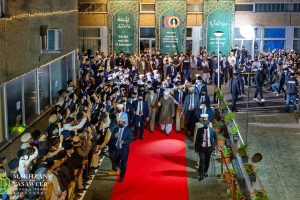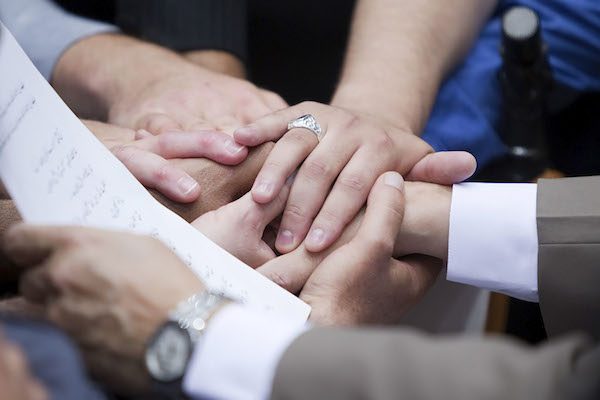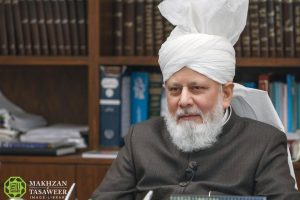
Qasim Choudhary, USA
To love and meet the emotional needs of a single person can be an intricate and painful endeavour. But imagine the patience and understanding required to share love that is not exclusively reserved for one, but millions. Such love ought to be indiscriminate to race, color, creed, and nation. But where does such a pure and wholesome love exist? Sieving through the pages of history we come across a treasury of precious moments of love shared between Ahmadi Muslims and their beloved Caliph, Hazrat Mirza Masroor Ahmad (aba). But I was curious to know, despite the Caliph’s demanding schedule, how he is able to connect to people of varying backgrounds spread across the globe. How is it that he can bring a smile to the face of a young Syrian girl, empower people in Africa, inspire students in the West to serve the East, and move men and women alike to tears simply by being in their midst for a few moments?
Dr Gary Chapman, most noted for coining the term ‘five love languages’theorises that there are five ways that people speak and understand emotional love. Everyone has a primary language they are most attuned to. But is this simply another unfounded theory or can the application of these languages help us in saving and strengthening our relationships? Can these languages help explain why people around the globe are drawn to the Caliph?
1. Words of Affirmation

‘We are prepared for insults, but compliments leave us baffled.’
– Mason Cooley
Verbal compliments and words of encouragement are essential to inspire and fortify self-confidence in people whereas nagging and constant nitpicking corrode the very foundation of a relationship. Encouraging words can help a child or spouse to take the first step towards their ambitions. No wonder it was the Holy Prophet (sa) who said, ‘A good word is also charity.’[1]It is interesting to note, that the Arabic word for charity Sadaqahis derived from a root sidqthat means sincerity.[2]This reinforces the idea that our words of appreciation must be genuine and heartfelt rather than hollow lip service.
Three little words each one of us craves to hear are ‘I love you’,and when said with kindness and tenderness they serve as a genuine expression of love.
This same genuine love was once expressed by a young Syrian girl, who uttered these three simple words to the Caliph. Though it was an exchange between a young girl and her Caliph, the hearts of millions completely melted when the Caliph responded with the words, ‘Allah bless you, and I love you too.’[3]
This beautiful moment reminded me of the words of the Holy Prophet Muhammad (sa) who stated, ‘The best of your rulers are those whom you love and who love you, who invoke God’s blessings upon you and you invoke His blessings upon them.’[4]
The Caliph and that little girl showed the world that expressing love is not at all difficult. As long as it stems from a pure and genuine place even a few words can put a smile on the face of millions.
2. Receiving Gifts

‘Always give without remembering and always receive without forgetting.’
– Brian Tracy
Anthropological studies reveal that gift-giving is a universal behaviour. It appears to be an expression of love that transcends cultural barriers. In fact, regarding the importance of gift-giving, the Holy Prophet (sa) states, ‘Give gifts and you will love one another.’[5]Those of us blessed to have an audience with the Caliph know a thing or two about gifts. Walking out of the Caliph’s office holding that glistening golden Twix chocolate or the priceless pen is a milestone experience Ahmadis worldwide can relate to. After a few months or even years, children and adults safeguard the chocolate wrapper and pen given to them by the Caliph. They serve as a visual symbol of love, and coming from the Caliph hold a special place in our hearts.
The following incident beautifully illustrates how a gift can leave a deep impression on the heart of another. A recent graduate from the Ahmadiyya Institute of Languages and Theology relates that once during a meeting, the Caliph noticed that he was wearing worn-out shoes with a loose piece of thread. Lovingly, the Caliph remarked, that he should purchase a new pair. A little over a week had elapsed and to his utter surprise, he was notified that the Caliph had already acquired new shoes for him. The same Caliph who receives thousands of letters and meets hundreds of people weekly assumed an additional responsibility typically reserved for a parent. Thus, perhaps even a parent’s love cannot compare to that shown by the Caliph.
Similarly, Umar Nayyar narrates, ‘I was in London for my convocation and my mother was also set to arrive and join me for this auspicious occasion. In a light manner my mother said she would need two hundred pounds for shopping and sightseeing. I told her not to worry as I would arrange whatever she needed. Little did she know I was facing financial strain and was deep in debt. After picking her up from the airport I dropped her off at the guest house returned to the office and resumed my work. Unexpectedly, beloved Huzoor (aba) [His Holiness] sent my entire class a letter. At least I thought it was a letter. To my astonishment, the envelope contained two hundred pounds from my beloved Huzoor (aba).’
3. Quality Time

‘The most precious resource we all have is time.’
– Steve Jobs
Dr Chapman expounding on quality time reveals that proximity is of less importance. What truly matters is spending focused attention with the person across from you. Despite the Caliph’s relentless schedule and vast responsibilities, he offers his time and presence to people. He attentively listens to the challenges and personal issues we face in our lives, and also takes joy in our happiness that we share with him.
One would think that with the rise of the Covid-19 pandemic, meeting the Caliph would be improbable. The pandemic, however, has hardly deterred Ahmadis from meeting their beloved Caliph; rather, it has presented more opportunities. Throughout the pandemic, the Caliph has been conducting regular virtual meetings with Ahmadis from all over the world. It serves as yet another testament to the Caliph’s love for his community, that despite the obstacles presented by the global pandemic he has adopted a means to continue communicating with Ahmadis worldwide. In these meetings, the Caliph mentors aspiring students, guides administrative heads on carrying out their responsibilities, and entertains a variety of questions on a vast array of subjects.
Once during a virtual meeting, the Caliph was asked how spends his time when he is not tending to his work. He replied, ‘I spend time off just like this. I am enjoying my weekly time off at this moment by holding a meeting with all of you. This is my weekly time off.’
Then there are those special moments of affection and warmth the Caliph radiates that are not caught on camera but occur daily. In this regard, an Ahmadi from the United States of America recounts, ‘Upon the instructions of Beloved Huzoor (aba), I spent two months of my summer vacation in London serving in the private secretary office. As my waqfe-arzi(temporary period of devoted service) drew to an end, I brought a cake into the office to share with my colleagues. It was my ardent desire that beloved Huzoor (aba) also take part in enjoying some cake.
Unexpectedly, Huzoor (aba) requested the presence of one of my colleagues in his office. To my utter amazement, beloved Huzoor (aba) enquired about me and my well-being. I was ecstatic to learn that Huzoor (aba) specifically mentioned me during their interaction.. Suddenly, around Maghrib[prayer after sunset] time, Huzoor (aba) came out from his office and looking towards me asked, ‘you’re eating cake’? I responded affirmatively. Lovingly Huzoor (aba) replied, ‘will you be eating cake all night?’ Huzoor (aba) asked if I liked brownie cake to which I replied yes and asked if Huzoor (aba) would like some. Upon this beloved Huzoor (aba) affectionately said,
تمہاری پلیٹ کونسی ہے میں تمہارے پلیٹ سے لے لوں گا
‘Where is your plate? I will take some from yours.’
4. Acts of Service

‘No one is useless in this world who lightens the burdens of another.’
– Charles Dickens
Those who hold acts of service as their primary love language, greatly appreciate and feel loved when someone aids them in a certain task or helps them in a time of need. Dr Chapman rightfully explains that learning this love language requires us to re-examine stereotypes of the roles of husbands and wives. In some cultures, the men do not take an active part in household affairs rather they drop that burden on the shoulders of women. But the Caliph, being a quintessential disciple of both the Holy Prophet (sa) and the Promised Messiah (as) is no ordinary man. In fact, the Caliph’s respected wife once remarked that despite his official duties even before his Caliphate, he would pay great interest to household matters, and show his complete cooperation.[6]Even after being entrusted the mantle of Caliphate, whether it’s wiping something off the floor, lifting heavy bags, or emptying the hoover, the Caliph performs these seemingly simple yet deeply impactful household chores silently and gracefully[7]. It can be tempting at times to remind people or even flaunt when doing a favour or task. It is only when acts of service are executed positively can they become a powerful expression of love.
One of the most powerful and selfless services we can do for another is to pray for them. This requires one to invest time, energy, and spend nights prostrating before God Almighty. Thus, the Promised Messiah (as) states, ‘Prayer is the best form of sympathy.’[8]
Once, the Caliph, Hazrat Mirza Masroor Ahmad (aba) eloquently stated,
‘It is only Khilafat [Caliphate] that is concerned for the problems of every Ahmadi living in all parts of the world; the Khalifa personally prays for them…There is no country in the world where my imagination does not take me; praying for the Ahmadis living there while awake or even when asleep.’[9]
In his inspirational diaries, Abid Khan, Press Secretary of the Ahmadiyya Muslim Community beautifully captures the mutual love and affection shared between Ahmadis and the Caliph. Narrating an incident of his own experience he mentions that he was once suffering from a fever and sore throat. Very lovingly and affectionately the Caliph enquired of his symptoms and brought him throat lozenges to soothe his throat and with his own hands His Holiness (aba) also poured a dose of homeopathy.[10]
5. Physical Touch

‘Nothing eases suffering like human touch.’
– Bobby Fischer
Why is it that in troubling times we instinctively hug one another? According to Dr Chapman, in times of crisis, more than anything, we need to feel loved. Although we cannot control the tragedies that come our way, we can manage and heal if we feel loved.
This reminds me of my own encounter with the Caliph back in 2016 when he was visiting Canada. I was dealing with a personal tribulation that weighed heavy on my shoulders. So much so that I had made up my mind to leave my studies at the Ahmadiyya Institute of Languages and Theology (Jamia) and return home to my family. It was only until I learned that Jamia students were expected to have an audience with our beloved Caliph did I stay back as a last-ditch effort. As I stood in line waiting to shake the Caliph’s hand, I was profusely praying like all Ahmadis do for a special moment with the Caliph. Then it happened. A special moment with the Caliph that lasted a total of ten seconds yet felt like an eternity. But in that little time, the Caliph spoke the five languages of love. As the Caliph passed his blessed hand over my face I could feel all my stress and anxiety evaporate. I experienced first-hand the Caliph’s innate ability to alleviate mankind of its worries and apprehensions. That special moment was a manifestation of the Caliph’s powerful words when he stated,
‘Stand ever ready to wipe away the tears of those who are in distress or hurting in any way.’[11]
وَلَیُبَدِّلَنَّھُمۡ مِّنۡۢ بَعۡدِ خَوۡفِھِمۡ اَمۡنًا
‘He will, surely give them in exchange security and peace after their fear.’[12]
About the Author: Qasim Choudhary is a graduate from the Ahmadiyya Institute of Languages and Theology in Canada, and serves as an Imam of the Ahmadiyya Muslim Community in the United States of America.
ENDNOTES
[1]Bukhari, Kitaab-al-Jihad
[2]The Philosophy of the Teachings of Islam, by Hazrat Mirza Ghulam Ahmad (as), (Eng. Translation) pg.64
[3]https://www.youtube.com/watch?v=ty2S0GHNsaI
[4]Muslim, Kitaab-al-Imaarah
[5]Al-Adab Al-Mufrad, Kitab Tasaruf Alaam, Bab Qabulil Hadiya
[6]https://rorenglish.wpengine.com/13846/huzuraba-an-exemplary-husband/
[7]https://voiceofbritishmuslimwomen.wordpress.com/2021/05/27/our-khalifa-in-the-quiet-the-greatness-of-humility/
[8]Malfuzat, Vol.2, by Hazrat Mirza Ghulam Ahmad (as), (Eng. Translation) pg. 248
[9]https://www.alhakam.org/khilafat-and-the-jamaat-two-sides-of-the-same-coin/
[10]https://www.pressahmadiyya.com/wp-content/uploads/2020/01/Europe-Tour-Sept-Oct-2019-part-2.pdf, pg.16
[11]https://www.khalifatulmasih.org/press-releases/humanity-first-conference-2021/
[12]The Holy Qur’an, 24:56




Add Comment